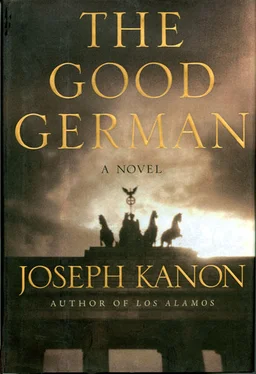Jake headed for the door, then turned. “The soldier yesterday-he was British?”
“No, American.”
He stood for a second, puzzled. Not an official, then.
“If he comes back, you will let me know? ”
She nodded, clutching the cigarettes, nervous again. “You’re sure there’s nothing wrong?”
Jake shook his head. “Maybe just another old friend. He might know something.”
“No,” she said, answering something else. “There was only you.”
A hospital would have records, Jake thought, but when he got there he saw that a fire had swept through that stretch of Liitzowstrasse, taking the Elisabeth and all its paper with it. Only a few walls were left, black and open to the sky, one of Ron’s decayed molars. A work brigade of women was clearing the site, handing pails of bricks along a line that snaked over the heaps of fallen beams and charred bed-frames. The breeze that had come up during the night was now a steady hot wind, blowing ashes, so that the women had had to cover their mouths with kerchiefs, like bandits. Jake stood for a while watching, trying not to notice the heavy stench that hung in the street. How long before one didn’t smell it anymore?
He wondered what she’d done here. Emil hadn’t wanted her to work, a traditional husband, so she’d left Columbia for idle afternoons at home. They’d had to take on Hannelore instead, a thick girl with inadequate English and, Jake assumed, a direct line to Nanny Wendt. But Lena still came to parties, until it became awkward to see foreigners and Emil asked her to stop, and then she only saw Jake. Had he ever suspected? Frau Dzuris didn’t seem to think so, but how could she know? There’d only been a few times in Pariserstrasse, when they couldn’t go to his place because Hal was there. Always careful, alert even to the flick of a curtain at a neighbor’s window. But Frau Dzuris had known somehow, maybe just from the look on their faces.
Emil, surprisingly, had been at the Anhalter when they’d all come to see Jake off, a defiantly raucous party, Hal and the rest of the gang guzzling champagne while Emil looked uneasily at the platform guards. Lena had given him flowers, the respectable send-off for an old boss, never meeting his eye until one of the party became sick and in the confusion of hustling him to the men’s room they’d finally had a moment together.
“Why did you bring him?” Jake said.
“He was there when they called from the office. I couldn’t come alone. How would it look?” She paused, looking down. “He wanted to come. He likes you.”
“Lena,” he said, reaching for her.
“No. No scenes. I want him to see me drink champagne and wave, like the others. Then we’ll take a taxi home and that’s the end.”
“I’ll come back,” he said, hurrying, hearing the loud bursts of English near the men’s room.
“No, you won’t. Not now,” she said simply, nodding toward all the uniforms on the platform.
“I’ll come back for you,” he said, looking at her until she raised her eyes again, her face softening, no longer public.
She shook her head slowly, glancing to see if the others were still away, then put her hand up to his cheek and held it there for a moment, her eyes on him, as if she were trying to memorize his face. “No. But think of me sometimes,” she said.
He stood there, just looking. “Lena,” he said, moving his face against her hand, but then she dropped it, a quick graze as she looked over his shoulder.
“My god, it’s Renate,” she said, pulling away. “They called her too? She’s crazy-it’s not safe for her.” He heard the platform noises again, the private second gone. When he turned, he saw Renate’s knowing sharp eyes, which had taken in Lena’s hand, the way they noticed everything. His best tipster, off the books because you couldn’t hire Jews. But she just smiled, pretending not to have seen.
“Hello, Joe, what do you know?” she said, American slang an endless joke.
“Hey, it’s Renate!” The boys back on the platform, surrounding them, Berlin closing in again. He tried to catch Lena’s eye, but she avoided him, hanging back with Emil, helping Hal pour champagne into cups. More drinks and jokes, Renate brazenly cadging a cigarette from a passing policeman with a flirtatious thank-you. Just to prove she could do it, while Hal looked on, appalled. With the train whistle, there was a final round of hugs, crushing the flowers. Emil shook Jake’s hand, looking relieved that the party was coming to an end.
“Any news on the visa?” Jake said to Renate, embracing her.
She shook her head. “Soon,” she said, not meaning it. Bright eyes, a head full of dark curls. The train attendant was closing doors.
“Jacob.” Lena’s voice, then her face next to his, a formal kiss on each side, light, leaving only the smell of her skin.
He looked at her, but there was nothing to say, not even her name, and the hands at his back were pushing him onto the train. He stood on the stairs as the train began to move, waving, hearing drunken auf wiedersehens, and when she took a step forward he thought for a second, wildly, that she would do it, run after the train and come with him, but it was only a step, a push from the crowd, so that the last thing he saw in Berlin was her standing still on the platform with Emil’s arm around her shoulder. ‹›The rubble women had stopped moving their pails, scrambling over the bricks to the middle of the building. One of them shouted down to the street, where another group picked up a stretcher from a cart and followed. Jake watched them lift a body out of the debris, turning their faces away from the smell, and swing it onto the stretcher as indifferently as if it were another load of bricks. The stretcher team plodded back, stumbling under the weight, then overturned it into a cart. A woman, her hair singed away. Where did they take the bodies? Some big potter’s field in the Brandenburg marshes? More likely a furnace to finish the burning. Renate would have died like that, her sharp eyes finally dulled. Unless she had somehow survived, become one of the living skeletons he’d seen in the camp, their eyes dull too, half alive. The crime so big that no one did it. But they’d kept records in the camps, the long roll calls. It was only here, under the bricks, that a numberless body could vanish without a trace.
He ran over to the cart and looked down. A stocky, faceless body; not Lena, not anybody. He turned away. This was as pointless as Frau Dzuris. The living didn’t vanish. Emil had been at the KWI-they’d know something. Army records, if he’d been in the war. POW lists. All it took was time. She’d be somewhere, not on a cart. Maybe even waiting for him in one of Bernie’s questionnaires.
Bernie, however, was out, called to an unexpected meeting, according to the message tacked on his office door, so Jake walked over to the press camp instead. Everyone was there, drinking beer and looking bored, the typing tables littered with Ron’s bland releases. Stalin had arrived. Churchill had called on Truman. The first plenary session would start at five. A reception had been arranged by the Russians.
“Not much, is it, boyo?” Brian Stanley said, a full whiskey glass in his hand.
“What are you doing here? Coming over to the other side?”
“Better booze,” he said, sipping. “I had hoped for a little information, but as you can see—” He let one of the releases fall to the bar.
“I saw you with Churchill. He say anything?”
“ ‘Course not. But at least he said it to me. Special to the Express. Very nice.”
“But not so nice for the others.”
Brian smiled. “Mad as hornets, they are. So I thought I’d poke around here for a bit. Stay out of harm’s way.” He took another sip. “There’s no story, you know. Can’t even get Eden. We ought to just pack it in, and instead there’s tomorrow to worry about. Want to see what our lot’s handing out?” He reached into his pocket and passed over another release.
Читать дальше












